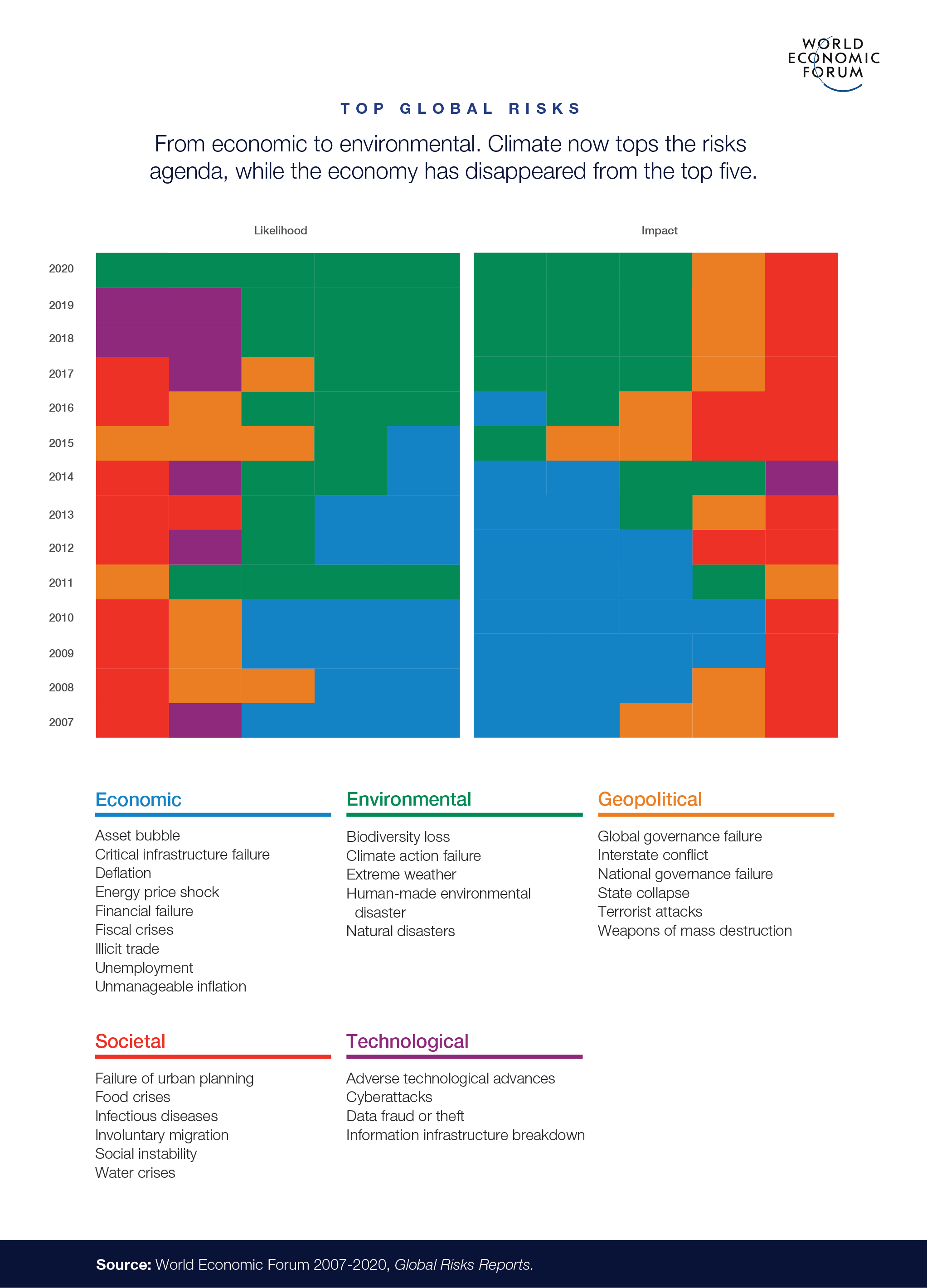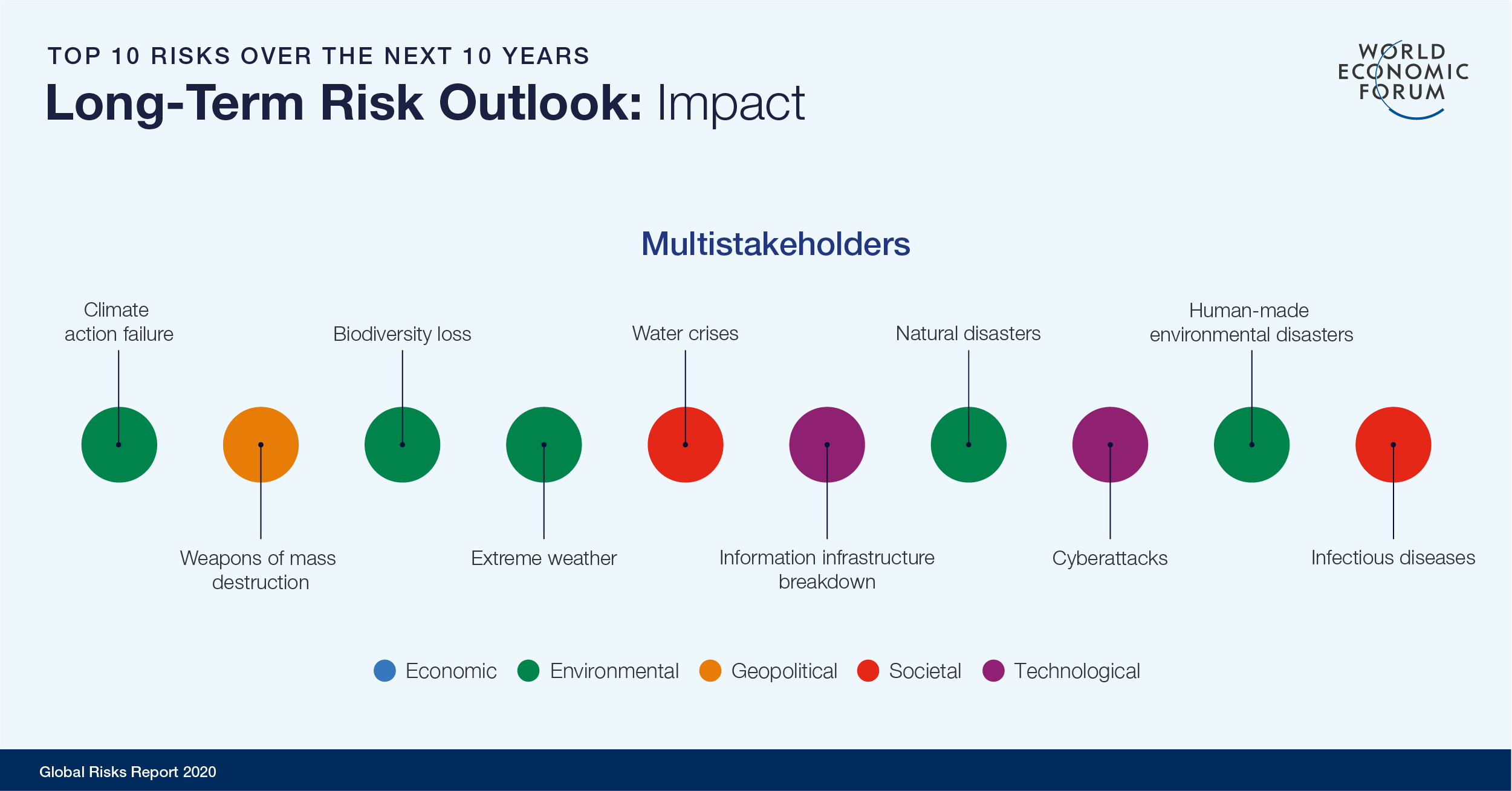The report forecasts a year of increased domestic and international divisions and economic slowdown. Geopolitical turbulence is propelling us towards an "unsettled" unilateral world of great power rivalries at a time when business and government leaders must focus urgently on working together to tackle shared risks, it says.
Over 750 global experts and decision-makers were asked to rank their biggest concerns in terms of likelihood and impact and 78% said they expect "economic confrontations" and "domestic political polarisation" to rise in 2020.
The report, produced in partnership with Marsh & McLennan and Zurich Insurance Group, points to a need for policy-makers to match targets for protecting the Earth with ones for boosting economies - and for companies to avoid the risks of potentially disastrous future losses by adjusting to science-based targets.
For the first time in the survey's 10-year outlook, the top five global risks in terms of likelihood are all environmental. These were: extreme weather events (e.g. floods, storms, etc.); failure of climate change mitigation and adaptation; major natural disasters (e.g. earthquake, tsunami, volcanic eruption, geomagnetic storms); major biodiversity loss and ecosystem collapse; and human-made environmental damage and disasters.

It is our younger generations that see the condition of the planet as most alarming. The report highlights how risks are seen by those born after 1980. They ranked environmental risks higher than any other respondents, in the short- and long- terms. Almost 90% of these respondents believe "extreme heat waves", "destruction of ecosystems" and "health impacted by pollution" will be aggravated in 2020. They also believe that the impact from environmental risks by 2030 will be more catastrophic and more likely.
But it is not all about the environment. The biggest risks by severity of impact over the next ten years also included weapons of mass destruction, while of all short-term risks, those who believed risk levels would increase in 2020, economic confrontations (78.5%) led the way ahead of domestic political polarisation (78.4%), extreme heat waves (77.1%), destruction of natural resource ecosystems (76.2%) and infrastructure cyberattacks (76.1%).

Meanwhile, António Guterres, secretary general of the United Nations, told the World Economic Forum attendees that the world faces four main challenges: climate change, mistrust of leaders, increased geopolitical tension, and the dark side of the technological revolution. However, he acknowledged that climate change was "the defining issue of our time" and represents an "existential threat" to humankind.
The comments were made in a statement during a plenary session of the Annual Meeting 2020 in Davos-Klosters, Switzerland during Jan-2020, during which he said: "I would use two words to describe the state of the world today: uncertainty and instability."
While there are clear concerns over the dark side of the technological revolution, a new World Economic Forum report, written in collaboration with PWC, has found that technology can play a major role in bridging a sustainability gap. 2030 is the "Decade of Delivery" to achieve the Sustainable Development Goals - yet the gap between where we are, and where the world need to be remains significant.
Unlocking Technology for the Global Goals shows that Fourth Industrial Revolution (4IR) technology can play a major role in bridging this gap, but acknowledges that new commitments and partnerships will be necessary to move beyond technological optimism.
Over 300 use cases of emerging technologies, including Artificial Intelligence (AI), Blockchain, Internet of Things, 5G and drones were analysed to build the case for how 4IR technologies could do more to accelerate progress towards the Global Goals. It found that across the goals, and their 169 targets, 70% could be enabled by 4IR technology applications already in use today.
To combat "chaos in cyberspace and ensure that artificial intelligence becomes a force for good, Mr Guterres called for the need to boost international cooperation. To that end, he said multilateral organisations should change their modus operandi to become more agile, working in networks. "Inclusive multilateralism" would extend beyond national governments to include more participation from local authorities, civil society, business leaders and others, he explained.